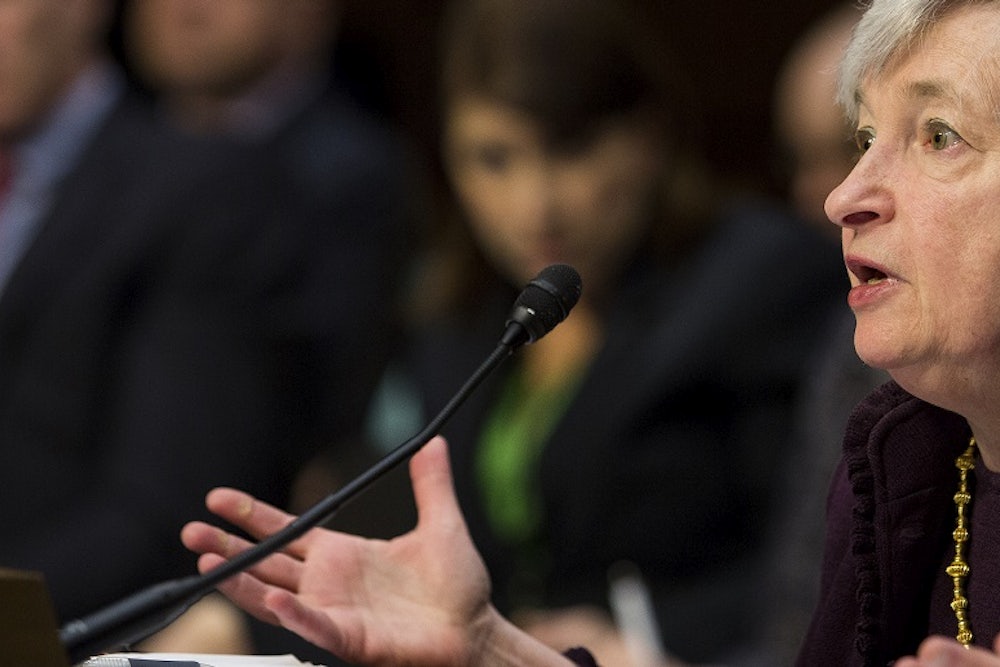Just like that, no one cares about the Federal Reserve again.
Bloomberg’s Nicholas Johnston is reporting that the Senate is planning to recess next week without voting on any of the three nominees for the Federal Reserve Board of Governors. During that recess—on May 28 to be exact—Governor Jeremy Stein will step down from his position to rejoin the Harvard faculty. With his departure, the Board will have just three governors for the first time in its history. In fact, it would only have two members except for the fact that Governor Jerome Powell has been re-nominated after his position ended last January and is allowed to continue serving in the meantime.
This is, to put it bluntly, inexcusable. The Federal Reserve is the most important economic actor in the U.S. economy. It has a host of new financial regulatory rules under Dodd-Frank. It is currently winding down its quantitative easing program, in which it bought hundreds of billions of dollars of mortgage-backed securities and Treasuries to spur economic growth. In other words, the Fed is very busy. As Binyamin Appelbaum noted earlier this week, the Board is already stretched thin with four members and will have trouble functioning with three members:
Now that the Fed has only four board members, most of the committees are solo affairs. Only the one that oversees bank supervision, headed by Daniel K. Tarullo, has a full complement of all three of the available governors.
Mr. Stein and Mr. Powell each run two solo committees, an arrangement the Fed has maintained in the hope of imminent reinforcement.
But if the board is reduced to three governors, the challenges would extend beyond asking Mr. Powell to be chairman of four committees. The remaining governors would be barred from speaking about policy issues except at formal meetings because any such conversation would involve a majority of the board.
Fortunately, the Senate plans to take up the nominees immediately after it returns from a week-long Memorial Day break. Senator Rand Paul has said once again that he plans to block the nominees unless he gets a vote on his Audit the Fed bill. That will slow things down for a few days, but ultimately, without the support of most of his caucus, Paul can’t stop them from moving forward. Assuming the Senate acts as scheduled then, the Board will have five members (out of seven) soon enough. (President Barack Obama hasn’t nominated anyone for the other two other positions.)
While the small period when the Board will have three members will likely have little material effect on the economy, it’s representative of a larger apathy towards the Federal Reserve. Few Americans, much less U.S. Congressmen, appreciate the vast power and importance of monetary policy in the economy. It is not omnipotent, but the Fed still has major control over economic growth. For instance, after sequestration kicked in during the spring of 2013, many economic analysts warned of a steep drop off in growth. That steep drop off never came. Austerity undoubtedly slowed the economy, but the Fed’s extraordinary policies played a vital role in reducing the fiscal drag.
During the Great Recession, the Federal Reserve made mistakes. It widely underestimated the deepness of the crisis and failed to act quickly enough in response. But it also used unconventional monetary policy tools that other nations refused to employ. That’s one of the big reasons the U.S. unemployment rate is at 6.3 percent and the Eurozone’s is 11.8 percent. For that, we have the Fed to thank.
President Obama and Senate Democrats should always make it a priority that the Board is full of highly qualified members. Congress would never let the Supreme Court fall to five members, much less three. Yes, Supreme Court openings are much rarer than openings on the Fed Board of Governors, but the principle still holds. The Fed is treated with an indifference disproportionate to its importance to the country, and its vital actions after the financial crisis haven’t changed a thing.
